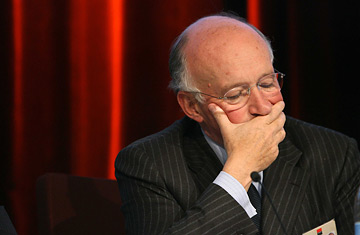
Daniel Bouton, CEO of French bank Société Générale.
Three days was all it took in 1995, after the bank-busting deals of rogue trader Nick Leeson had come to light, for the venerable Barings Bank to file for bankruptcy and forever vanish. Managers at France's Société Générale may well be wondering why their agony endures, a week and counting after a far bigger scandal that cost it $7.13 billion to unwind — and that subjected its risk control procedures to public mockery. Yet the end is still not in sight. The SocGen's board of directors, meeting in emergency session, left chairman and president Daniel Bouton in place. That action probably wasn't a vote of confidence as much as it was acknowledgment that SocGen's travails have only begun.
The board's rejection of Bouton's resignation surprised many observers, considering who has been calling for heads to roll after the bank's staggering losses from allegedly unauthorized speculative activity by Jérome Kerviel, a junior derivates trader. Earlier in the week, French President Nicolas Sarkozy led a parade of government officials signaling expectations that the highest ranks of the bank's management would step up and assume responsibility in the affair. "We are in a system where, when you have a big salary — which is without doubt legitimate — and there is a big problem, you cannot escape your responsibilities," Sarkozy said Monday, in an evident reference to Bouton.
"Société Générale is in crisis," added Finance Minister Christine Lagarde on the eve of the bank's board meeting. "The board members are there to decide whether or not the person in charge is the best one to steer the ship or if a change of captain is needed."
In the end, however, the board agreed with the large group of Société Générale employees assembled in support of Bouton outside the bank's headquarters. They stressed the short-sightedness of vengefully sacking an otherwise proven manager just when the shattered bank most needs him. "You don't throw the captain overboard when the ship is sinking," said board member Philippe Pruvost, who represents employees.
A disparate cast of characters across French society echoed Pruvost's defense of Bouton. Former conservative prime minister and Sarkozy archrival Dominique de Villepin lashed out at the "hysteria characteristic of how this crisis has been handled," and warned against "the search for a scapegoat" as an easy response to it. Michel Marchet, an official with the Communist-affiliated CGT labor union and thus no friend to de Villepin or to big capital in general, stressed that his organization "does not want Daniel Bouton to leave."
Why this noble sense of solidarity with the besieged? Indeed, how was it a country where movers of international finance are generally regarded with suspicion and disdain that a call went up to save the seat of a bank honcho? Particularly one whose supposedly ultra-sophisticated in-house security system evidently failed to detect the largest trading abuse in history?
Collective survival instinct, for one. With investigations underway by the Paris stock market regulators and shareholder lawsuits proliferating, Société Générale is now considered a fat and defenseless takeover target. The likely prospect that its post-merger work force would be slashed is a chilling one in a France groggy with nearly 8% unemployment. During trading Tuesday, SocGen's stock price jumped nearly 11% amid heavy trading on rumors rival BNP is planning a hostile bid on the bank. That prospect appeared even more feasible on Wednesday, as BNP announced 2007 profits of $11 billion — smaller, to be sure, than 2006, but far better than European competitors reporting billions of losses linked to subprime exposure. Against that troubling background, many SocGen employees fondly recalled Bouton's deft defensive moves in fending off BNP's hostile bid in 1999.
Sympathetic press reports have also noted that Bouton's actions in the face of the crisis provided additional reason for keeping him on. Despite the enormous blow Kerviel's activities dealt the bank's finances and image, Bouton was able to quickly enlist international heavyweights like JPMorgan Chase and Morgan Stanley to back an $8 billion capital increaseand has already convinced two big French businesses, Groupama and Caisse des Dépots, to subscribe to it.
In excerpts of the interrogation transcript leaked to the daily Le Monde, Kerviel contends his superiors knew of his illicit activity and turned a blind eye to it. "I can't believe my superiors weren't aware of the amounts I was committing, because it's impossible to generate such big profits with small positions," Le Monde cites Kerviel telling investigators. "That led me to believe that as long as I was in the black, my superiors closed their eyes to the methods and volumes involved."That suggests that even more destabilizing revelations for Société Générale may be in the offing. And that could unlock the lips of shareholders who have filed suit against the bank, but have thus far shied away from calling for Bouton's ouster until the crisis is over. Indeed, it is, perhaps perversely, the gravity of SocGen's situation that makes some prefer to cling to Bouton for now. CGT union official Marchet says he opposes Bouton's ouster because "it would necessarily signal the arrival of someone from the outside to liquidate" the bank. SocGen's board and employees — along with much of the French public — would prefer to postpone that day of reckoning for as long as possible.
